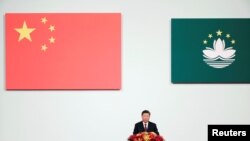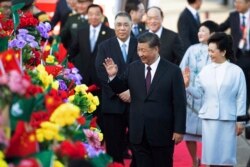In his address to the 20th Handover Ceremony in Macau last Friday, Chinese President Xi Jinping seemingly committed a gaffe that appeared to reveal his intention of setting the implementation of “one country, two systems” in Macau as a good example for neighboring Hong Kong and even Taiwan.
But analysts say that proving the scheme works by awarding the former Portuguese colony with favorable "economic goodies" won’t impress people in Hong Kong and Taiwan, who demand greater democracy.
“China wants to promote the ‘one country, two systems’ scheme, which has proved to be a total failure in Hong Kong. I don’t think China can keep fooling people in Hong Kong and Taiwan, none of which will accept the scheme,” Democratic Progressive Party legislator Wu Ping-jui said in Taipei.
The Macau model
Last Friday, Xi said that Macau tells a story of the success in implementing the ‘one country, two systems,’ addressing a celebration of the 20th anniversary of the city’s return to China
“The people in Macau have whole-heartedly embraced the ‘one country, two systems.’ Let’s recognize that the ‘one country, two systems’ is the best system for Hong Kong [sic] to maintain its long-term prosperity and stability,” Xi said.
Although Xi went on to say “after the return of Hong Kong and Macau to China, the handling of matters in those two special administrative regions is completely China’s domestic affairs,” his earlier reference to Hong Kong instead of Macau is widely seen as indirectly “scolding” rebellious Hong Kong and venting his “dissatisfaction with the situation in Hong Kong,” said Sin Chung Kai, treasurer of the Democratic Party in Hong Kong.
Sin, formerly a legislator, said that Hong Kongers have long accepted the Macau model as a success for Beijing, which wants to accommodate its big spenders outside its borders in Macau while prospering the casino city’s population of 650,000 people to earn the world’s second-highest gross domestic product per person in terms of purchasing power.
One country v.s. two systems
But the flaw in the Macau model is the widening the wealth gap in the city and its lackluster success in implementing the political scheme, whose principle of one country has completely overshadowed the emphasis on two systems either in Macau or Hong Kong, Sin said.
“In reality, the disparity in Macau is serious… I don’t think the Macau people are very happy about the development although they don’t have much resistance because they’ve already been used to the influence of Beijing,” Sin said.
According to Ho Lat Seng, Macau’s chief executive, Xi has given his full support to the casino city’s development in Hengqin, an island west of Macau and south of Zhuhai, as part of Beijing’s massive plan to develop the Guangdong-Hong Kong-Macau Greater Bay Area into a world-class urban cluster that could rival global cities also situated on bays, such as San Francisco, New York or Tokyo.
Economic goodies?
But during his three-day visit in Macau, the Chinese leader didn’t announce new policies or “economic goodies,” aimed at diversifying Macau’s gaming-dependent economy and developing it into a financial center to replace Hong Kong as the media had previously speculated.
Nevertheless, any such attempt of using Macau to dwarf Hong Kong will only prove to be futile as the former British colony has long established itself as a fully internationalized city with advanced financial expertise and a talent pool, according to Sin.
“Well, if I say Macau is a financial money-laundry hub, I think people will agree. But if you say Macau is a financial hub, I think people will laugh,” he said.
Sin said the fact that Beijing continues to misjudge Hong Kongers by focusing on economic incentives and ignoring their demands for free speech, the rule of law and democratic values is why Beijing will have a hard time winning the hearts and minds of Hong Kongers or putting an end to its months-long political turmoil.
He said it also highlights clashing values between Hong Kongers and their fellow countrymen on the mainland.
Clashing values
“They [mainlanders] talk about development; they talk about how great the country is… They talk about G2 etc… But people in Hong Kong won’t be proud of these things. So, it is a clash of value systems,” he said.
In other words, Macau can never replace Hong Kong, a noted Chinese writer Ngan Shun Kau argued in a column on the Stand News, a Chinese-language news website.
On the contrary, Hong Kong would completely replace Macau, had the proposal to set up casinos on Lantau Island — the largest island in Hong Kong located at mouth of the Pearl River — been implemented two decades ago. Hong Kong would be a more popular destination for mainland tourists and gamblers, he said.
Macau’s casino money is, in particular, of little attraction to Taiwan, which is already a high-tech powerhouse and a beacon of democracy in Asia, DPP’s Wu said.
“China has to find a place to showcase [the success] of the ‘one country, two systems’ or provide an excuse to the scheme’s failure in Hong Kong or the Communist Party’s rule of China,” Wu said.
“It’s a very stubborn political organization, which is trying to use the [Macau] model to build narratives for the world and its domestic audience. These are typical characteristics of an authoritarian regime,” he added.





